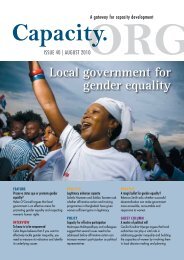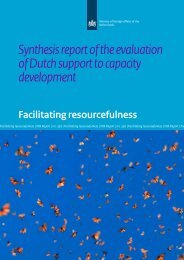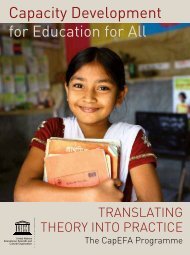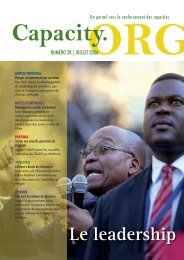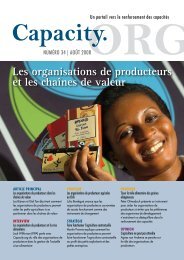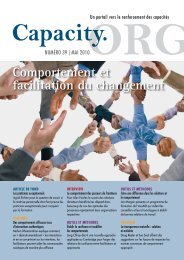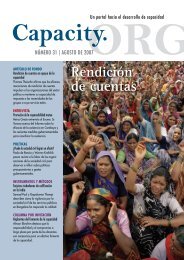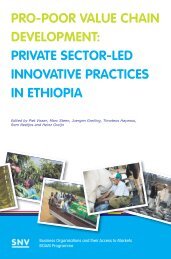Facilitating multi-actor change - Capacity.org
Facilitating multi-actor change - Capacity.org
Facilitating multi-actor change - Capacity.org
Create successful ePaper yourself
Turn your PDF publications into a flip-book with our unique Google optimized e-Paper software.
‘supply’ and ‘demand’ sides of the process.(This is easier said than done, particularlywhen the facilitator is a pro-poor, civil society<strong>actor</strong> aware of skewed power relationshipsthat favour elitist governance structures.)In earlier projects, citizens had beenencouraged to participate but it was soonclear that amplifying the voice of the citizenswould have little effect if nobody waslistening. Learning this helped us to bridgethe rift between supply and demand. A veryinteresting example of this was support forthe creation of systems to redress grievancesin some municipalities. The citizens wereencouraged to flood the municipality withservice-related complaints. Simultaneously,the municipal officials and electedrepresentatives were sensitised and given thecapacity to respond by making strategic<strong>change</strong>s in their complaints systems. Even themost advanced complaints redressal systemsbecome defunct if citizens do not use them,while municipalities would never realise theimportance of social accountabilitymechanisms unless there was a demand.The importance of inclusivenessEnhancing capacity and promotingknowledge ex<strong>change</strong> are crucial. Facilitatorsmust be present on site throughout the courseof the intervention and they must f<strong>org</strong>erelationships with local civil society groupsand citizens’ <strong>org</strong>anisations. The ex<strong>change</strong> ofknowledge allows local people to give theirperspectives on issues related to the socioeconomic,cultural and planning aspects ofthe city. Facilitators must make sure that theyinform the citizens and local partners aboutall relevant policies, schemes andentitlements, and that they present thetechnicalities of planning in an accessibleway using local languages. It is essential to beaware of and use existing social networkssuch as religious groups and neighbourhoodgroups, as well as professional associationssuch as colleges, trades associations andchambers of commerce to expand thestakeholder base to include the entire city.Then knowledge and ideas can really begenerated from different fields.Including womenWomen are the real agents of <strong>change</strong> becausethey are the best representatives of many ofthe silent and marginalised groups. Womenhave higher hopes that, with the help ofexternal support, their efforts could makethings better – and they tend to be free oflocal political allegiances. Instead of beinghighly critical, they <strong>org</strong>anise themselves andget things done. In the cities of Raipur andRanchi, women <strong>org</strong>anised themselves intoneighbourhood groups and demanded publictaps, toilets and dustbins – and they got them.However, this was not the case in thesmall towns we worked in, where womenwere reticent about coming out into thepublic domain. It took months before agender balance could be achieved incommunity meetings. In these cases, it wasWomen collect their daily water ration from a new community tap in Mumbai, Indiaimportant to emphasise that they shouldparticipate actively (merely being there wasnot enough) and recognise that they hadimportant issues to share. It was interestingto observe that while men contributed tophysical infrastructure issues, women, whenthey started speaking, shared insights intoissues such as the lack of higher educationinstitutes, which caused their children to goaway; or the absence of street lights, whichrestricted their mobility. They spoke too ofthe dearth of maternal care centres, and toldmany stories of women having their babieswhile travelling to distant clinics.Do not discard technical expertiseTechnical expertise that is on the side of thepoor and marginalised <strong>change</strong>s the powerequation. It is important that developmentprofessionals respect technical expertisebecause they expect technical experts to acceptthe necessity of participatory processes. It isimportant that architects, planners, urbandesigners and other experts interact directlywith the people. Certainly, there is a need toplace participatory planning in collegecurriculums, but it is even more important thatit is instilled into the psyches of the technicalexperts. A good illustration of this is the storyof a community that was demanding a waterpipeline in their area, but the municipality wasasking them to shift to another area if theywanted better services. It escalated into a hugemisunderstanding with the people in thecommunity feeling very mistrustful of the localgovernment. The problem arose because thesettlement was partially situated on hard rockthrough which water pipelines could not bedrilled. A planner and geologist intervened, acompromise solution was reached and in-situresettlement was carried out to make wateravailable for every family.Technical expertise can also be useful inassessing the priority of people’s needs andexplaining about the equitable distributionof limited resources. For example, peoplefrom better-off economic backgroundssometimes suggest planning ideas forAlamy / India imagesairports and shopping malls when their townstill lacks proper basic services such as waterand sanitation.Small achievementsSmall achievements sow the seeds of hugesuccesses. Getting a small tap installed orrehabilitating one slum settlement proves tothe people that efforts yield results. Suchvictories build trust and enthusiasm andencourage more people to participate. Theyalso enhance the quality of participationconsiderably once people realise that theirefforts can make a difference.Small successes are also important for thelocal governments to showcase theirwillingness to become responsive. This isespecially so in political environments wherethe devolution of resources and power arestill very much the gift of the higherechelons of government.Access to informationInformation and knowledge are power – andgiving the poor and marginalised access tothem leads to their empowerment. Historically,information about policies, planning standards,the provision of services and entitlements todevelopment resources was largely inaccessibleto the marginalised majority – and even whenit was made available, it was presented inincomprehensible language that rendered itinaccessible. One of the roles of facilitators isto decode such planning jargon, not only forthe common citizens but also for electedrepresentatives. Equipped with the rightinformation and analysis, people can start totake charge of interventions and producesustainable solutions.But if they are to move beyond pilotprojects to schemes with larger coverage andgreater impact, they must have the support ofnational and district governments; as onlygovernments can provide the huge resourcesneeded for the next step.



